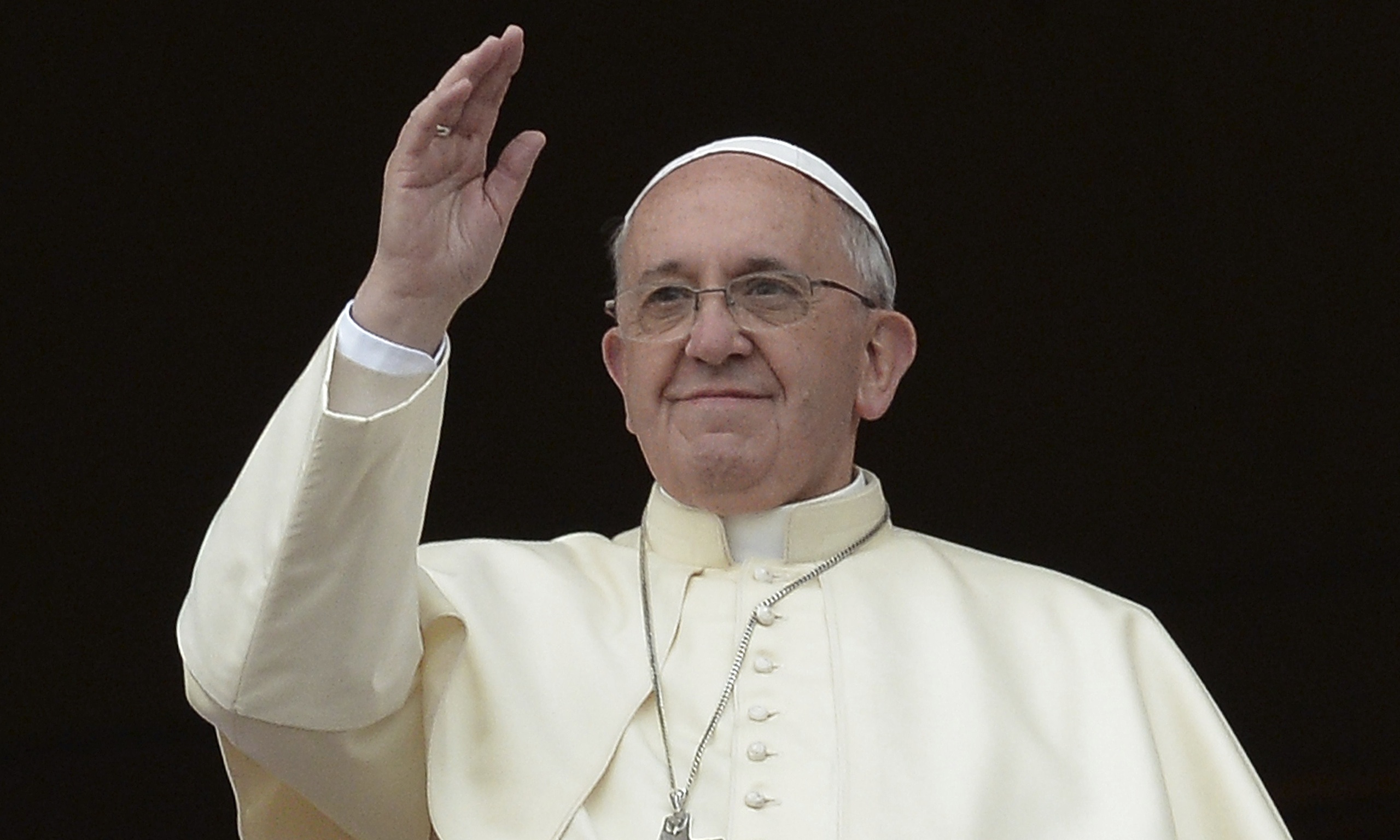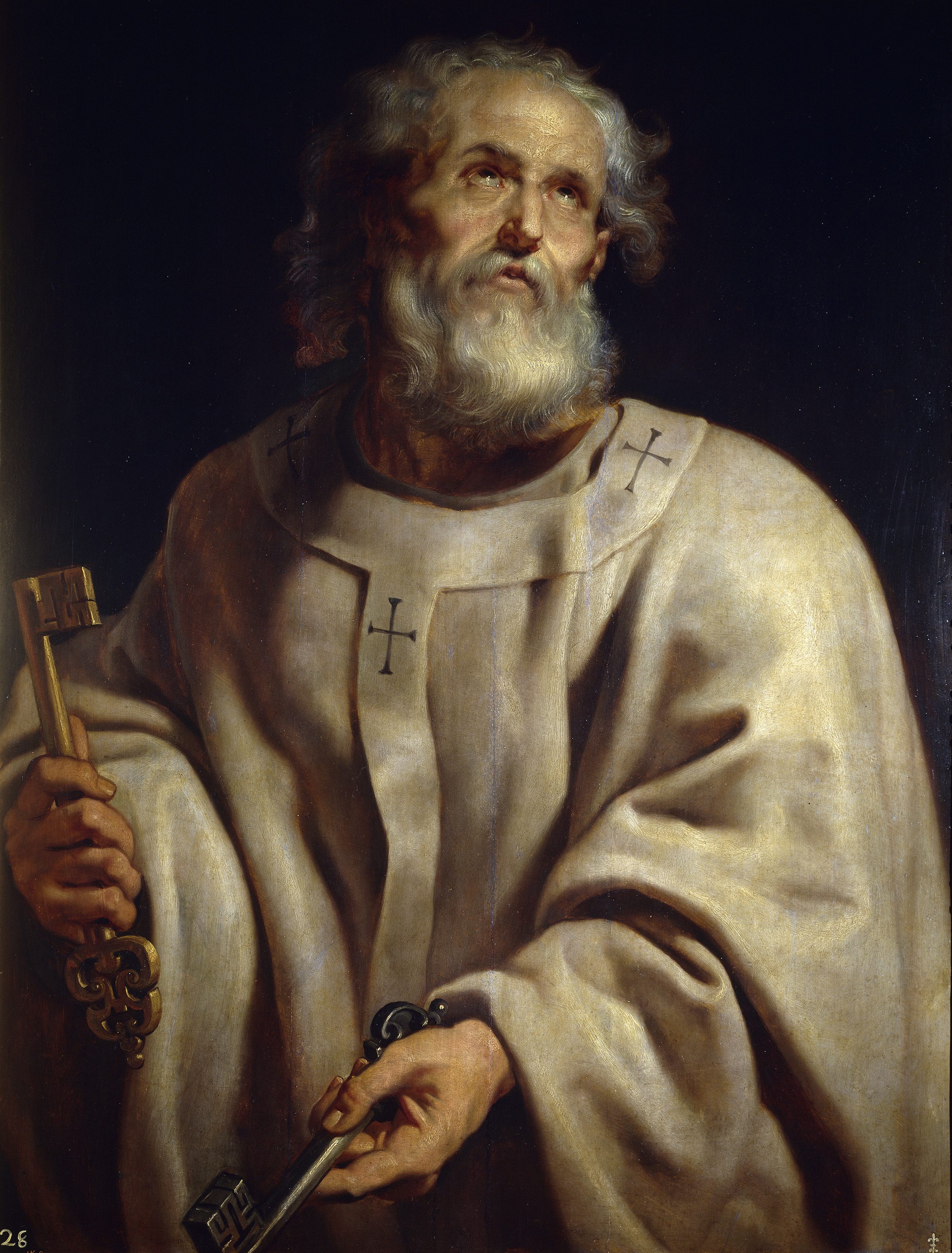First of all, I want to say that, in writing this post (or any of the other posts in this series) I am not trying to disparage the beliefs of Protestants or anyone else. I just want to try to explain Catholicism a bit, because it seems there’s a lot of misunderstanding about it (most of which I had myself at one time or another). And I want to share why I chose to become Catholic myself.
That said, I’m kind of excited to write this post about the pope.

I want to write about why there is a pope and why he has authority. But I realized that I couldn’t quite explain all that without getting into the Magisterium (had to look the word up to write this) and Sacred Tradition vs. sola Scriptura a bit too. Bear with me, please.
The reason I’m excited to write about all this is that learning about these things myself helped me gain a much deeper understanding of and appreciation for the Catholic Church. It just made so much sense once I understood it. It’s fascinating to me to think about how old the Church is. And frankly, I’m interested to see if I can write about all this in a coherent fashion. It was harder than I thought it would be, to be honest. You be the judge

One of the things that prompted my separation from religion was my observation that no one seems to agree on what the Bible really means. I found it so annoying that people could come up with a justification for almost anything, supposedly through interpreting Scripture. It seemed like the meaning of the Bible depended simply on whom you asked. I though it was a bunch of nonsense and considered it evidence that the Bible just didn’t mean anything.
When I began learning about Catholicism, I came across the phrase sola Scriptura, and learned that this was one of the main theological beliefs of the Reformation, a key point on which Protestants differ from Catholics. Sola Scriptura means, “by Scripture alone,” and is the idea that the Bible provides all the information necessary for salvation, that it is the only true source of Christian doctrine, and that it needs no interpretation, because it interprets itself. But this just didn’t make sense to me, largely for the reason mentioned above that everyone interprets the Bible differently.
The principle of sola Scriptura was introduced by Reformists as a way to reject the authority of the Catholic Church, and thus the pope, at the time of the Protestant Reformation. However, sola Scriptura isn’t actually taught anywhere in the Bible (according to many sources I have checked, both Catholic and Protestant. I certainly haven’t read the whole Bible yet to confirm this for myself).
Then I learned that the Catholic Church holds that Christian authority lies in both the Bible and Sacred Tradition. Sacred Tradition is the oral teachings of Jesus that He handed down to his apostles, and that they in turn handed down to their disciples, and so on.
I like to think of it like this: Imagine that the founding fathers of our country had written the Constitution and then simply said, “There you go! This is all you need. Go forth and govern thyselves!” That would have been dumb. Of course they didn’t do that. They were smart enough to know that if they did not provide us with a system of government to help us interpret and apply the Constitution, all heck would break loose and people would be using it for their own purposes all willy-nilly with no one agreeing on what the laws and ideals of our country actually are or how we should follow them.
Likewise, Jesus did not leave us with nothing but a Bible, for people to interpret for themselves all willy-nilly. That doesn’t make sense. Jesus left us the apostles and His Church and the Holy Spirit. And if you believe that the successors of the apostles were led by the Spirit to infallibly create the Bible, then it only makes sense that these same successors (the pope and bishops) would be capable of passing down Sacred Tradition through the authority given to them by Jesus and with the help of his Holy Spirit. If you don’t believe that the Church, and thus its leaders the pope and bishops, has this authority and ability to make infallible decisions, then you can’t really be certain that the Bible is infallible.
Jesus gave His apostles authority and instructed them to teach, and He gave them the Holy Spirit to help them do so. The Magisterium is the authority of the Church, primarily as it is exercised by the successors of Jesus’s apostles, namely the pope and the bishops.
“So then, brethren, stand firm and hold to the traditions which you were taught by us, either by word of mouth or by letter” (2 Thessalonians 2:15).
In fact, when Jesus was still alive, He made Peter the head of His Church.
“And so I say to you, you are Peter, and upon this rock I will build my church, and the gates of the netherworld shall not prevail against it” (Matthew 16:18).
St. Peter was the first pope.

I was so excited when I learned this and then came to understand the idea of “apostolic succession,” that the popes throughout the history of the Church have succeeded, one after another, in a direct line from St. Peter!
Now, to be clear, the doctrine of papal infallibility does not mean that the pope is free from sin or error. It also doesn’t apply only to the pope, but also to the body of bishops as a whole, but only when they, in unity with the pope, are solemnly teaching a doctrine to be true. The pope and bishops are not infallible in all things. But they are the successors of Jesus’s apostles, to whom He said, “He who hears you hears me” (Luke 10:16) and “Whatever you bind on earth shall be bound in heaven” (Matthew 18:18).
So, in a nutshell, Catholics believe in the authority of the Church, and in particular the pope and the bishops, because Jesus established the Church this way. He left His apostles with Sacred Tradition and the Holy Spirit, with the authority to build His Church and guide people in their faith. He appointed Peter to be the head of the Church, and the popes of history have succeed in a line from Peter. To say that we don’t need a pope or Sacred Tradition because the Bible is the inspired Word of God and is all we need, is to forget that the Bible was compiled by men of the Catholic Church, using Sacred Tradition and the guidance of the Holy Spirit to do so.
I know this is a clumsy explanation. As I said, this was harder to write about than I thought it would be. I hope it makes sense, but I’m happy to try to clear things up if I’ve left anything out or been unclear about something. I’d love to hear your thoughts!
*******
I have had a few questions come my way, so the next one I’ll take on is this one from my friend Liz, “Do Catholics have a ‘priesthood?’ And if so, how is it used and who is given it?”



That wasn’t at all clumsy to me, but that could very well be the result of my own testimony that Christ runs His Church through authority (which is why I was/am curious about the priesthood) and organized it through apostles and St. Peter. Which is probably a really confusing claim to make, since you just perfectly explained how the Pope is a direct line of that authority.
In short, The Church of Jesus Christ of Later-day Saints (mormon) claim that authority was lost in what many protestants call the apostasy. But we aren’t a protestant or reformation Church, because we believe the authority Peter had, had to be restored to the Earth (and we believe that happened in the spring of 1829). So yeah, this all made sense to me. The line of authority comes from Christ and was given to Peter.
I’m enjoying this series. I took a world religion class in college and have always loved learning about other theologies. Recognizing our differences definitely isn’t disparaging.